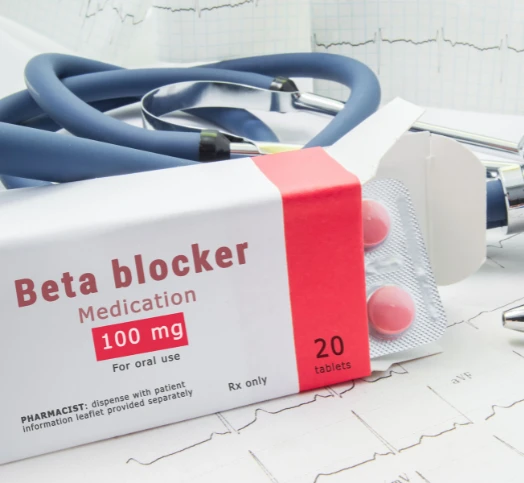Beta-blockers are a class of medications that are commonly used to treat high blood pressure, angina, heart failure, and other heart-related conditions. They work by blocking the effects of adrenaline on the heart and blood vessels, which can reduce heart rate and blood pressure, as well as improve blood flow to the heart.
Beta-blockers are prescribed to millions of people worldwide, and they are considered a safe and effective treatment option for many heart-related conditions. There are some important side effects to be aware of. In this article, we’ll take a closer look at beta-blockers, how they work, and what you should know if you are taking these medications.
Beta-blockers target specific receptors known as beta receptors, which are primarily found in the heart and blood vessels. These receptors are part of the sympathetic nervous system, which regulates the body’s response to stress and emergency situations. There are two main types of beta receptors, beta-1, and beta-2 receptors, each with distinct locations and functions. When adrenaline and noradrenaline bind to these beta receptors, they initiate a series of responses. For instance, in the heart, stimulation of beta-1 receptors leads to an increase in heart rate and contractility, while beta-2 receptor activation causes relaxation of blood vessel walls.
How do beta-blockers work?
Beta-blockers work by blocking the beta-adrenergic receptors in the heart and blood vessels. These receptors are responsible for responding to adrenaline and other stress hormones, and by blocking their effects, beta-blockers can reduce heart rate, blood pressure, and other symptoms related to heart disease.
There are two types of beta receptors: beta-1 receptors, which are primarily found in the heart, and beta-2 receptors, which are found in the lungs, blood vessels, and other tissues. Most beta-blockers are selective for beta-1 receptors, which means they mainly affect the heart and have fewer side effects on other parts of the body.
Beta-blockers can also reduce the workload on the heart by decreasing the amount of oxygen the heart needs to pump blood. This can be especially helpful for people with heart failure or other conditions that affect the heart’s ability to pump blood efficiently.

What conditions are beta-blockers used to treat?
Beta-blockers are a class of medications utilized to address a range of heart-related conditions. These include:
-
High Blood Pressure (Hypertension): Beta-blockers work by reducing the force of your heart’s contractions and slowing down your heart rate, which ultimately leads to decreased blood pressure.
-
Angina (Chest Pain): By limiting the workload on the heart, beta-blockers help alleviate angina symptoms. They achieve this by diminishing the heart’s demand for oxygen and, consequently, the pain associated with angina. More information here.
-
Heart Failure: Beta-blockers can be beneficial in heart failure management by enhancing the heart’s efficiency and helping it pump blood more effectively. This can result in improved symptoms and a better quality of life.
-
Abnormal Heart Rhythms (Arrhythmias): These medications can aid in maintaining a regular heart rhythm by controlling the electrical signals that trigger irregular beats. Beta-blockers are particularly useful for certain types of arrhythmias.
-
Migraine Headaches: Some beta-blockers have demonstrated effectiveness in reducing the frequency and severity of migraine headaches. While the exact mechanism is not fully understood, these medications seem to have a positive impact on migraine triggers.
-
Anxiety Disorders: Beta-blockers can be prescribed for certain anxiety disorders, such as performance anxiety or social anxiety. They can help alleviate physical symptoms like trembling and rapid heartbeat that often accompany these situations.
Additionally, beta-blockers might play a preventive role in certain scenarios. For instance, they might be prescribed to individuals who have experienced a heart attack to reduce the risk of a subsequent one. It’s important to note that the use of beta-blockers should be guided by a medical professional, as they consider your specific health condition and individual needs.
Common Adverse Reactions and Considerations
Similar to all medications, beta-blockers have the potential to trigger side effects, although they won’t affect everyone. It’s not uncommon for patients to describe rather vague symptoms, such as a general feeling of bodily sluggishness, without being able to pinpoint the exact cause. Over time, these symptoms often subside as the body becomes accustomed to the medication, underscoring the importance of giving the treatment a fair chance. Additionally, certain beta-blockers might be better tolerated by some individuals than others, making it advisable to engage in a thorough conversation with your healthcare provider regarding these aspects.
I may frequently adjust dosing from a morning to evening schedule, as it can assist some of my patients in managing these symptoms effectively
Here’s an overview of some of the potential side effects associated with beta-blockers:
Common Side Effects:
-
Fatigue: A prevalent side effect, beta-blockers can lead to a sense of tiredness or reduced energy levels. This is often due to the medication’s impact on heart rate and blood pressure.
-
Dizziness or Lightheadedness: Some individuals might experience a sensation of dizziness or feeling lightheaded when standing up or changing positions. This is typically due to the medication’s influence on blood pressure regulation.
-
Nausea or Vomiting: Certain individuals might experience gastrointestinal symptoms such as nausea or vomiting, particularly when beginning the medication. This side effect is generally temporary.
-
Cold Hands and Feet: Beta-blockers can sometimes cause a reduction in blood flow to the extremities, resulting in cold hands and feet. This is a result of the medication’s effect on blood vessels.
-
Sexual Dysfunction: It’s possible for beta-blockers to impact sexual function, leading to difficulties such as decreased libido or erectile dysfunction. This side effect can have psychological and physical factors.
-
Depression or Anxiety: In some cases, beta-blockers might contribute to feelings of depression or anxiety. This could be related to the medication’s influence on neurotransmitters or individual sensitivities.
Less Common but Equally Important Side Effects:
-
Shortness of Breath or Wheezing: In some instances, beta-blockers can cause respiratory issues like shortness of breath or wheezing, particularly in individuals with a history of respiratory conditions like asthma. Care needs to be taken with patients who have asthma and are regularly taking puffers. Alternative medicines may be more appropriate for such patients.
-
Slow Heartbeat: While beta-blockers are prescribed to regulate heart rate, in some cases, they might slow the heart rate excessively. Cessing or reducing the dose can assist here.
-
Swelling in the Legs or Ankles: Beta-blockers can contribute to fluid retention, leading to swelling in the legs or ankles. This could be indicative of an underlying issue that needs attention.
-
Confusion or Memory Problems: Some individuals might experience cognitive side effects, such as confusion or memory problems. These are less common but should be taken seriously.
- Vivid Dreams: Some individuals may experience heightened dream activity or more vivid and intense dreams while taking these medications. This phenomenon can be attributed to the influence of beta-blockers on certain neurotransmitters and their impact on sleep patterns.
-
Allergic Reactions: Although rare, allergic reactions to beta-blockers can occur. These reactions might manifest as skin rashes, itching, or more severe symptoms like difficulty breathing.
It’s important to note that the severity and likelihood of these side effects can vary from person to person. If you’re prescribed beta-blockers, your healthcare provider will monitor your response closely and adjust the treatment plan as needed. If you experience any unusual or concerning symptoms while taking beta-blockers, it’s advisable to seek medical attention promptly.

How are beta-blockers prescribed?
Beta-blocker dosage will depend on the specific condition being treated, as well as other factors such as age, weight, and overall health. Beta-blockers come in a variety of forms, including tablets, capsules, and injections.
It’s important to take beta-blockers as prescribed, and not to stop taking them suddenly without your healthcare provider’s input. Suddenly stopping beta blockers can cause a rebound effect, which can lead to an increase in heart rate and blood pressure, as well as other symptoms.
Dosage Personalization: The dosage of beta-blockers is not a one-size-fits-all approach. It’s determined based on factors such as the severity of the condition, the individual’s response to the medication, and any potential interactions with other medications they might be taking. For instance, the dosage for high blood pressure might differ from that for heart failure or arrhythmias.
Age and Weight Considerations: Age and weight are crucial considerations in beta-blocker prescription. Elderly patients might require lower doses to mitigate the risk of side effects, while younger individuals could tolerate higher doses. Similarly, weight can impact the distribution and metabolism of the medication, influencing the appropriate dosage.
Some commonly used beta-blockers are listed below:
| Generic Name | Trade Names (Worldwide) | Available Tablet Strengths |
|---|---|---|
| Atenolol | Tenormin, Noten | 50 mg |
| Metoprolol | Lopressor, Betaloc, Minax | 50 mg, 100 mg |
| Propranolol | Inderal, Deralin | 10 mg, 20 mg, 40 mg, 80mg |
| Bisoprolol | Zebeta, Emcor, Bicor, Cardicor | 2.5mg, 5 mg, 10 mg |
| Carvedilol | Coreg, Dilatrend | 3.125 mg, 6.25 mg, 12.5 mg, 25mg |
| Nebivolol | Bystolic, Nebilet | 2.5 mg, 5 mg, 10 mg |
| Sotalol | Sotacor, Betapace | 80mg, 160mg |
Remember, only a qualified healthcare provider can determine the suitable beta-blocker type and dosage based on your individual circumstances. It’s crucial to adhere to their guidance and attend scheduled appointments to optimize your treatment outcome and overall well-being.
Conclusion
In conclusion, beta-blockers constitute a frequently prescribed class of medications with proven efficacy in addressing a range of heart-related conditions. While potential side effects exist, the majority of individuals tend to tolerate beta-blockers favorably. In many instances, the advantages of these medications surpass the associated risks. It is paramount, however, to maintain open communication with your healthcare provider, enabling informed decisions that align with your specific health needs and goals.










